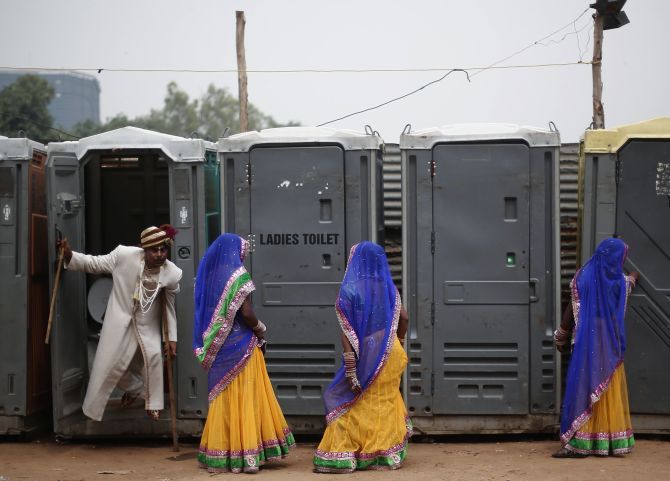Ending open defecation by 2019 will require changing minds, not just allocating money to build latrines for people that will either go unused or not be built at all.

During Prime Minister Narendra Modi’s Independence Day speech, we learned that his Swachch Bharat Mission to eliminate open defecation in India by Mahatma Gandhi’s 150th birth anniversary, would begin in less than two months on October 2. What was missing, though, was how? How will the government achieve its goal by 2019? What should the mission entail?
Well, let’s examine the government sanitation policy to date for a moment. For the past 15 years, the Total Sanitation Campaign, and then the Nirmal Bharat Abhiyan, have been trying to improve sanitation coverage across rural India by building both household and community latrines. But despite these efforts, there has been little reduction in open defecation. In fact, from 2001 to 2011, latrine coverage in rural India increased by about one percentage point each year. At this rate, it would take 50 years to eliminate open defecation. Continuing with the same policy is, therefore, not going to help achieve the government’s goal.
A recent study that my colleagues and I at the Research Institute for Compassionate Economics conducted on sanitation attitudes and behaviours in rural north India provides some insight into why the current policy is failing.
We visited over 3,200 households in five states and collected data on over 22,000 household members. We found that there is an incredible distaste for government latrines. Over half of the people in the four largest states of the study who have a government latrine in their home don’t use it on a regular basis. Part of this is driven by the people’s disgust for latrines. In addition, people prefer latrines with unnecessarily large pits because they are worried that the smaller pits in government latrines will fill up. They don’t want to deal with cleaning these pits.
We also found that many of our respondents prefer open defecation, even when they have access to their own privately-built latrine, and perceive few health benefits of using a latrine. Forty-four per cent of the respondents with a working latrine have at least one household member who nevertheless chooses to defecate in the open. Almost half of the individuals who defecate in the open cite pleasure, comfort, or convenience as one of their reasons for doing so, and the same fraction believe that defecating in the open is at least as good for child health as using a latrine.
What do these findings suggest for the future of sanitation policy in India? Latrine construction is not enough. Any successful campaign will need to address the reasons why people don’t use latrines in the first place. It will need to convince people to use latrines, even the ones with small and affordable pits.
Ending open defecation requires changing minds, not just allocating money to building latrines for people that will either go unused or not be built at all. Under the current sanitation policy, there is a provision for Information, Education, and Communication, but the spending on such activities is capped to 15 per cent of the budget, signalling that it should be considered secondary to latrine construction. The result is that only six per cent of the total sanitation budget has been spent on IEC till date. Instead of capping the IEC budget, the government should be prioritising it.
What India needs is a latrine use revolution, led by the country’s top leadership and known to every rural Indian. The prime minister clearly prioritises sanitation as an issue. But we need him to talk about latrine use, not just construction. We need the country’s best marketing experts to come up with clever messages that an army of dedicated behaviour change staff at the district and block levels will spread throughout rural India. We need to foster a market of pit-cleaners, so that people will not be afraid to use latrines with smaller and more affordable pits. We need to systematically and periodically collect data on toilet usage rather than just toilet construction, so we know how we are measuring up to the goal of eliminating open defecation by 2019. Most of all, we need to experiment like crazy to find the best strategies for changing people’s sanitation behaviours.
Fortunately, there are a number of large-scale campaigns that we can learn from. We need our latrine use revolution to look like Modi’s election campaign, which reached every village in India; like the Pulse Polio campaign, which eradicated polio in the country; like the anti-tobacco campaign, which has made even the most socially isolated aware of the negative health consequences of using tobacco products; the Aadhaar campaign, which enrolled 600 million Indian citizens in just five years. There is every reason to believe that a sanitation campaign of such epic proportions will help the government achieve its goal of a Swachch Bharat by 2019.
Over the next few weeks, the new government has the unique opportunity to break with the past in order to tackle India's persistent sanitation challenge. Eliminating open defecation is hugely important for the long-term growth of the Indian economy and the development of its human capital, but the only way that the government is going to achieve its goal is if it starts a mass campaign reaching from the offices of politicians in Delhi to the homes of villagers across India.
So, I eagerly await October 2, I hope that the government will learn from its previous mistakes.
-- The writer works with RICE, a research organisation based in Delhi that focuses on sanitation










